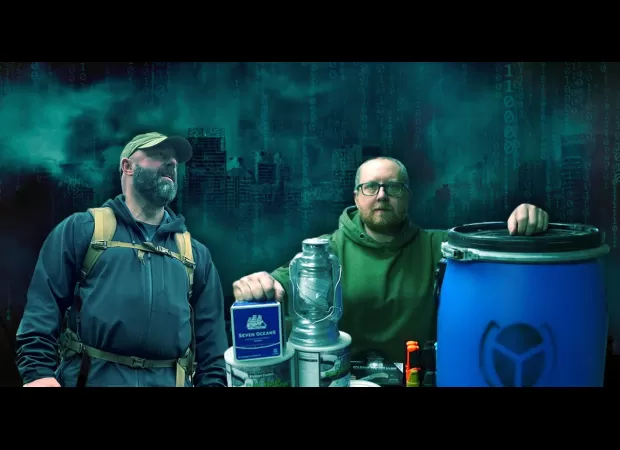We need to prepare for war as it approaches.
People in dire situations resort to extreme measures in order to stay alive.

As tensions continue to rise and the threat of disaster looms, Britain's preppers are prepared to face whatever may come their way. Imagine this scenario: your phone is dead, the power is out, and there's no way to access food. What's your plan? These are the questions that have been on many people's minds as the risk of 'World War Three' seems to grow with each passing day.
The world is on the brink of a potential catastrophe, and this is evident in the Doomsday Clock, a scientific measure of how close we are to disaster. The clock is set to be updated this afternoon, and currently, it stands at 90 seconds to midnight. This update comes just days after Admiral Rob Bauer, who chairs NATO's Military Committee, urged people to make basic preparations for a potential 'full-blown war.' He emphasized the importance of having necessities like water, batteries, and a radio to survive the first 36 hours, as not everything can be planned for.
The world has been advised to take basic precautions in case of war, but for a growing number of 'preppers,' also known as survivalists, this is nothing new. They have been ready for any disaster for years, whether it's a stockpile of canned food, a car equipped with blankets, or an emergency bag filled with flares. Tom Blakey, a former member of the elite Pathfinders Platoon, knows the importance of quick reactions, having served in Kosovo, Northern Ireland, Iraq, and Afghanistan. He operated behind enemy lines, gathering and relaying information to the British Army's 16 Air Assault Brigade.
Tom, now 52, explains that the first 36 hours of any disaster are crucial, but surviving the first night is just the beginning. He warns that an attack may not come in the traditional sense, but rather through a cyber attack that could disrupt our phones, energy supplies, and water infrastructure. He stresses the importance of having a plan B, as anything can happen in a disaster. Tom's upbringing instilled in him a will to survive, with his father conducting fire drills and teaching his children to always be aware of their surroundings.
After an injury cut his time with the Army short, Tom had more time to explore the internet during the pandemic. It was then that he discovered the prepping community on YouTube and realized he had valuable skills to share. Now, he wants to pass on his survival knowledge to others, especially as the world continues to face new challenges.
The prepping movement originated in the US, where it is often associated with extreme events like alien invasions or zombie outbreaks. However, for British preppers, it's more about preparing for risks like climate change or conflict. Tom acknowledges that there is a stigma attached to the word 'prepper,' with many assuming they are conspiracy theorists hiding in the woods. He attributes this to the portrayal of preppers in America, where the focus is often on guns and weapons rather than practical skills.
In times of uncertainty, it's only natural to want to be prepared for whatever may come. That's why the prepping community continues to grow, with people from all walks of life coming together to share knowledge, skills, and resources. So, as the world waits to see what the Doomsday Clock will reveal, Britain's preppers will remain ready to respond to any disaster that may come their way.
In Britain, there is a growing community of individuals known as "preppers" who are prepared for any type of disaster. Imagine this scenario: your phone is not working, the power is out, and there is no accessible food. What would you do? These are the types of questions that have been encouraged to be considered as the possibility of a third world war looms.
The world is on the brink of the next update of the Doomsday Clock, a scientific tool that measures how close we are to a global catastrophe. Currently, it stands at 90 seconds to midnight, and the new "time" will be announced later today. Just days ago, Admiral Rob Bauer, who chairs NATO's Military Committee, urged people to take basic precautions in case of a full-blown war.
According to the Admiral, having a supply of water, a battery-operated radio, and a flashlight can make all the difference in the first 36 hours of a disaster. He emphasized the importance of being aware that not everything can be predicted and planned for.
However, for a growing number of preppers, also known as survivalists, there is no need for a warning. They have been prepared for years, with their cupboards stocked with canned food, blankets in their cars, and emergency bags filled with flares. Tom Blakey, a former member of the elite Pathfinders Platoon, is one of these preppers.
Tom, who has served in various war zones, knows the value of quick reactions in life or death situations. He explains that surviving the first 36 hours of any disaster is crucial, but it is only the beginning. The threat of war may not come in the traditional sense, but rather through a cyber attack that can cripple our communication and infrastructure.
Tom's upbringing also played a role in his preparedness. His father, who served in the Army, would conduct fire drills at home, and Tom and his brother were required to climb out of windows as if escaping a real fire. They were not allowed to wear hoods or headphones, as their father wanted them to be alert and aware of their surroundings at all times.
After an injury cut his Army career short, Tom had more time to explore the internet during the Covid pandemic. He stumbled upon prepping videos on YouTube and realized that he had valuable skills to contribute to the prepping community.
In the US, prepping is often associated with extreme events like alien invasions or zombie outbreaks. However, in Britain, preppers are more focused on potential risks such as climate change or conflict. Tom believes that there is a stigma attached to the term "prepper," as people often associate it with conspiracy theorists hiding in the woods. He blames the American prepping culture, which tends to focus on stockpiling weapons rather than basic survival skills.
But for Tom and other British preppers, being prepared for any type of disaster is just being practical and responsible. They believe that having a plan and necessary supplies can make all the difference in a crisis. If you want to stay updated with the latest news and stories, you can join the Metro WhatsApp community to receive breaking news and videos from their website. So, are you ready for whatever the future may bring?






